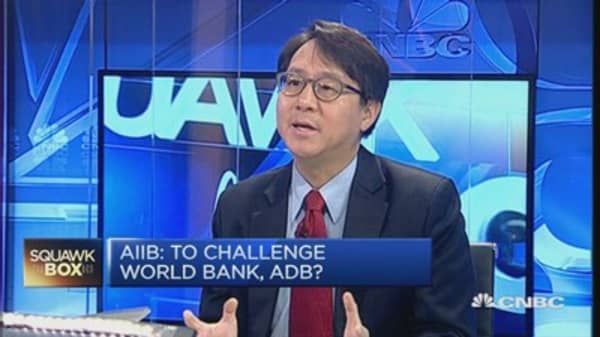China has made clear its plans for an institution that will act more quickly than bureaucracy-bound rivals. That's music to the ears of borrowing nations eager to finance ever more miles of roads and power transmission lines.
So what should the world now watch for as the AIIB moves forward?
First, China now has the opportunity to go from rhetoric to reality in building a "lean, clean and green" international financial institution. As with all such commitments, it will be the execution that matters. Clear metrics, strong safeguards and a strategy for implementation are essential.
None of this will be easy, particularly if shareholders become caught up in the battle for procurement and personnel appointments that have at times plagued other multilateral organizations. One clear indicator of the unwritten influence of China will be what percentage of AIIB staff and leadership will go to Chinese citizens, as well as what share of future procurement on AIIB-financed projects goes to Chinese state-owned enterprises. Transparency and accountability will be true tests of the AIIB once it is up and running.
Initial media reports indicate that China will provide nearly $30 billion of the bank's initial $100 billion capital base. At the end of the day, money talks. With China having put up the largest share of the funds for the AIIB, its voice and influence will understandably be larger than that of any other shareholder.
As the provider of the largest share of capital as well as likely the largest number of staff, China will have numerous levers to apply behind the scenes to shape AIIB priorities and projects.
Read More Is AIIB the answer to Asia's infrastructure needs?
Second, China's ability to act as consensus builder even as it may want to pursue its national interests wholeheartedly will now be put to the test.
Here, China's past actions at the ADB and other multilateral organizations underscore why there is legitimate concern over China's future behavior at this newest of international financial institutions. All of the major international financial institutions are ultimately political creations – despite any soaring language to the contrary. Less-than-best practices, such as prioritizing nationality over merit when it comes to hiring, may well become entrenched at the AIIB as they have elsewhere. China, for example, may well insist behind the scenes that the president of this new institution should always be drawn from China's bureaucracy, much as the ADB president is drawn from Japan's.
One further test of the AIIB and its leadership under the Chinese will be the new bank's ability to do projects in nations with which China has territorial disputes. Indeed, China's increasingly assertive position in the South China Sea and elsewhere in Asia has brought it into conflict with the Philippines, Vietnam, Indonesia and India among other potential borrowers from the AIIB.
During my time on the ADB board of directors, I saw firsthand how China's domestic and international political agenda forced the ADB at times to change course. In one case, China refused to grant permission to ADB staff to visit the city of Fuzhou to investigate an alleged case of non-compliance with the bank's safeguard policies.
In other cases, some of the region's poorest Pacific nations failed, coincidentally or not, to receive Chinese support at the ADB board level for projects if they had recognized the government on Taiwan. Efforts to provide assistance in one of the poorest parts of India, known as Arunachal Pradesh but claimed in part by the Chinese, also were stymied by China.
Read MoreJapan says no to China's big bank plans...for now
Third, if China and other AIIB shareholders are serious about building infrastructure in Asia, they must recognize that the long-term solution to filling Asia's infrastructure financing gap is not another international financial institution no matter how big the AIIB might eventually become.
The AIIB and its shareholders must now focus on addressing the "little bric" – the bureaucracy, regulation, interventionism and corruption – that holds back much of Asia's sustainable development. This includes encouraging a rule of law and a system of good governance essential to the private-sector led growth.
At the end of the day, the emergence of the AIIB can be a good thing for international development if it forces other multilateral organizations to be more efficient and more effective. The challenge is to ensure that competition driven by the AIIB over projects and programs does not result in a race to the bottom when it comes to social, environmental and other safeguards.
In the run-up to the recent signing ceremony, numerous western nations were won over to join the AIIB as founding members despite the reported objections of the United States and Japan. The challenge to western shareholders in particular will be to show now that their own commitment to shaping the AIIB from the inside into a better bank is more than words alone. Skeptics who maintain that founding members were driven primarily by hopes for future personnel placements and procurement awards will need to be proven wrong. Results will matter more than anything else in silencing critics. That now is China and the AIIB's challenge.
Commentary by Curtis S. Chin, a former U.S. Ambassador to the Asian Development Bank. He is currently managing director of advisory firm RiverPeak Group. Follow him on Twitter at @CurtisSChin.




